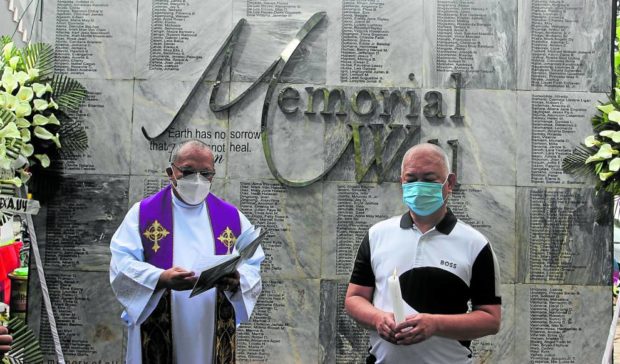Sendong tragedy lesson: Being prepared crucial in calamities, says CDO mayor

HONOR Cagayan de Oro City Mayor Rolando Uy lights a candle at the Memorial Wall for those who died in the floods spawned by Typhoon “Sendong” (international name: Washi) on Dec. 16, 2011, during the commemoration of the tragedy on Friday. —RYAN D. ROSAURO
CAGAYAN DE ORO CITY—Ruby Dalay Madriaga, 54, reminisced the day 11 years ago when her entire community in Isla de Oro, a sandbar in Consolation village here in the middle of a river, was wiped out by rampaging waters spawned by Typhoon Sendong (international name: Washi).
Madriaga had just alighted from a bus from Iligan City sometime past 9 p.m. on Dec. 16, 2011, when told that the floods had obliterated their neighborhood. She lost two sisters-in-law and two cousins who remain missing up to this day.
The floods, which struck Cagayan de Oro starting at around 9 p.m. on Dec. 16, 2011, until the early hours of the next day, engulfed 41 of the city’s 80 villages, 27 of which lie along the Cagayan de Oro River, killing 969 people, displacing some 230,000 others and damaging some P2 billion in properties.
Although weak, Sendong dumped a one-day rainfall of 180.9 millimeters, measured at the state weather bureau’s Lumbia station here, higher than the average December rainfall of 117 mm from 1977 to 2005, swelling the water level in the river from the normal height of 2 meters to 9.86 meters.
Memorial
According to an assessment of the tragedy done by the National Economic and Development Authority (Neda), “the heavy downpour overran the infiltration capacity of the relatively barren soils, thus, excessive volume of rainwater flowed down as surface run-off.”
Article continues after this advertisementThe Neda said the barren soil was caused by deforestation due to “logging, mining and short-term crop production in the affected watersheds, including in the natural forests.”
Article continues after this advertisementOn Friday, the city commemorated the tragedy with survivors and relatives of those who perished attending a Holy Mass sponsored by the local government at St. Augustine Cathedral.
Mayor Rolando Uy then led the lighting of candles and laying of wreaths in a memorial for Sendong victims at Gaston Park near the cathedral.
Uy said the tragedy brought by Sendong should be remembered for its lessons in disaster preparedness, pointing out that the same ecological issues that precipitated the massive flooding in 2011 are still there.
At about the same time last year, the city experienced flooding in various urban villages with the onslaught of Typhoon “Odette” (international name: Rai), which devastated a number of areas in Mindanao and the Visayas on Dec. 16, 2021.
Never forget
Within the last six months this year, a series of low pressure area incidents spawned massive floods in six urban villages, displacing hundreds and killing about five people.
Uy has entered into a cooperation with the Misamis Oriental provincial government for joint disaster response as well as in tackling common ecological concerns that cause flooding.
“We will never forget the pains and anguish that we’ve been through during Sendong. This is why we are striving to make our city and its residents safe from calamities,” said Uy, who was chief of Carmen village at that time.
“The lives lost during Sendong can only be honored if we have an adequate road map for ensuring a disaster-resilient city,” Uy added.
According to the City Housing and Urban Development Department, a total of 14,650 families were displaced in the aftermath of the storm and in the course of building a flood control megadike in the city. Of these, 10,468 families have been resettled.
RELATED STORIES
WHAT WENT BEFORE: Tropical Storm ‘Sendong’
Sendong’ disaster foretold 3 years ago